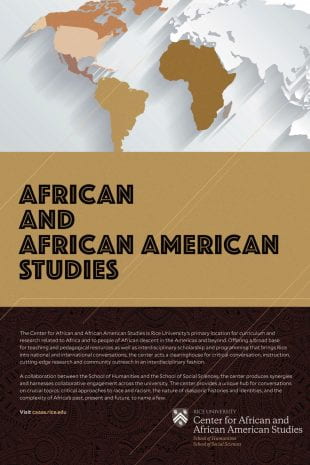MEDIA ADVISORY
Katharine Shilcutt
713-348-6760
kshilcutt@rice.edu
Rice U. launches Center for African and African American Studies
CAAAS will provide unique hub for conversations about race, identity and more
HOUSTON – (Oct. 14, 2019) – Rice University has announced the creation of a robust new center in response to increasing interest and expertise in African and African American Studies on campus.
 The Center for African and African American Studies (CAAAS) was launched this week, jointly housed within the Schools of Humanities and Social Sciences. The center is designed to provide a unique hub for conversations on such important topics as critical approaches to race and racism, the nature of diasporic histories and identities, and the complexity of Africa’s past, present and future.
The Center for African and African American Studies (CAAAS) was launched this week, jointly housed within the Schools of Humanities and Social Sciences. The center is designed to provide a unique hub for conversations on such important topics as critical approaches to race and racism, the nature of diasporic histories and identities, and the complexity of Africa’s past, present and future.
Anthony Pinn, the Agnes Cullen Arnold Professor of Humanities and professor of religion, will serve as its founding director.
CAAAS will draw on the work of a dozen current faculty, with plans to hire more in the coming years, making it an “important intellectual home for some of Rice’s most outstanding researchers, a number of its most committed university citizens and a range of dedicated teachers,” said Kathleen Canning, dean of Humanities.
Creating such a hub is crucial to such a multifaceted discipline as African and African American Studies, said Susan McIntosh, interim dean of Social Sciences.
“Our understandings about the complexity and richness of African and African American experiences draw not only on history, religion, literature and the arts but also on the social institutions, politics and culturally mediated perceptions that shape peoples’ lived experiences,” she said.

Anthony Pinn, the Agnes Cullen Arnold Professor of Humanities and professor of religion, will serve as the founding director of CAAAS. (Photo by Tommy LaVergne)
In its first year, CAAAS will focus on expanding the current African Studies minor into a minor in African and African American Studies with two possible tracks and courses across the departments of Anthropology, English, History, Religion, Sociology and Political Science. Pinn and his team are also developing an introductory course that will anchor the new minor.
“Within this one course, students will get a sense of how these two longstanding intellectual enterprises developed, the kinds of questions they ask, the kinds of methods they make use of and the kinds of theories that ground them,” Pinn said.
Pinn is enthusiastic about the unique opportunities afforded by Rice’s small size and Houston’s vast sprawl. The unconventional nature of Rice, he said, will allow CAAAS to tackle African and African American studies in its own interdisciplinary tradition.
“And if you take into consideration where we are, this city is cosmopolitan and diverse like no other,” he said. “There is a wealth of knowledge in Houston that ought to contribute to a Rice education. Houston has a lot to teach us and the center will be one of those ways in which we’ll open up the lines of communication.”
-30-
Related materials:
Center for African and African American Studies: caaas.rice.edu
This news release can be found online at news.rice.edu.
Follow Rice News and Media Relations via Twitter @RiceUNews.
Located on a 300-acre forested campus in Houston, Rice University is consistently ranked among the nation’s top 20 universities by U.S. News & World Report. Rice has highly respected schools of Architecture, Business, Continuing Studies, Engineering, Humanities, Music, Natural Sciences and Social Sciences and is home to the Baker Institute for Public Policy. With 3,970 undergraduates and 2,934 graduate students, Rice’s undergraduate student-to-faculty ratio is just under 6-to-1. Its residential college system builds close-knit communities and lifelong friendships, just one reason why Rice is ranked No. 1 for quality of life and for lots of race/class interaction and No. 4 for happiest students by the Princeton Review. Rice is also rated as a best value among private universities by Kiplinger’s Personal Finance.

